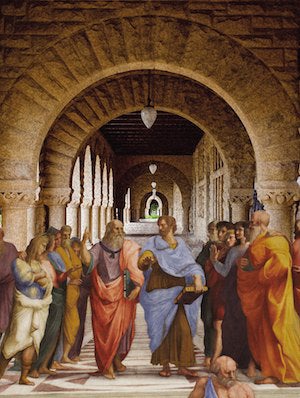|
January 23, 2012
Advice from Socrates and Plato: Stanford's 2012 Tanner Lectures explore ancient philosophies as ways of life
This year's Tanner Lectures will focus on Socrates, Plato and Plotinus, and how they offered their students not just an education, but a way of life. By Corrie Goldman

In two lectures at Stanford, John Cooper, director of the Program in Classical Philosophy at Princeton, will delve into the ancient philosophies of Socrates and Plato and describe the relevance of their views on human nature and psychology in the moral lives of their supporters. Philosophy is often regarded as a purely academic pursuit. Every year philosophy students around the globe diligently learn the works of Aristotle, Epicurus, Plato and Socrates, to gain an appreciation for their methods of argumentation and reasoning. But as Princeton's John Cooper will outline in the upcoming Tanner Lectures, many of the ancient philosophers intended not just to educate their students but to offer them a way of life.
In two lectures, Cooper, the director of the Program in Classical Philosophy at Princeton, will delve into the ancient philosophies of Socrates and Plato and describe the relevance of their views on human nature and psychology in the moral lives of their supporters. In his first presentation, "Ancient Philosophies as a Way of Life: Socrates" on Jan. 25, Cooper will show how Socrates created a model of philosophy as a complete way of life that was replicated by many of his contemporaries.
Turning to the later philosopher Plotinus in his second talk, "Platonist Philosophy as a Way of Life: Plotinus" on Jan. 26, Cooper will explore the incorporation of devotional exercises in Platonist philosophy as an effort to remain relevant in the spiritually trying times of late antiquity.
Co-hosted annually by Stanford's Bowen H. McCoy Family Center for Ethics in Society and the Office of the President, the Tanner Lectures on Human Values aim to transcend ethnic, religious and ideological distinctions. Free and open to the public, both talks will be held at the Stanford Humanities Center from 5:30 to 7 p.m.
Philosophy Professor Debra Satz, director of Center for Ethics in Society, described the Tanner talks as "some of the best lectures offered in the academy on issues of enduring importance that are also aimed at promoting general discussion of human values."
Cooper's scholarship in ancient Greek philosophy spans the areas of metaphysics, moral psychology, philosophy of mind, ethics and political theory. In his forthcoming publication Pursuits of Wisdom: Six Ways of Life in Ancient Philosophy from Socrates to Plotinus, Cooper examines six central philosophies of living. His book Reason and Human Good in Aristotle was awarded the American Philosophical Association's Franklin Matchette Prize.
Established in 1978 by Obert Clark Tanner, an industrialist, legal scholar and philosopher, the Tanner Lectures on Human Values are held at nine universities each year and are meant to advance and reflect upon the scholarly and scientific learning relating to human values.
"We are honored to have John Cooper as this year's lecturer at Stanford," said Stanford President John Hennessy, who will give the opening remarks at Cooper's first lecture.
"When Professor Tanner established the series, he said, 'I hope these lectures will contribute to the intellectual and moral life of mankind. I see them simply as a search for better understanding of human behavior and human values.'
"There is no question that Professor Cooper's thoughtful examinations of ancient philosophy have stimulated important discussion and deepened our understanding of the human experience."
The day after each of the lectures, classics and philosophy scholars will respond to the central issues presented by Cooper. On Jan. 26, Stanford's Alan Code and Sarah Broadie of St Andrews will respond to "Ancient Philosophies as a Way of Life: Socrates," and on Jan. 27 Anthony Long from the University of California–Berkeley and Jaclyn Maxwell of Ohio University will lead the discussion on "Platonist Philosophy as a Way of Life: Plotinus."
Both discussion sessions will take place from 10 a.m. to noon in the Landau Economics Building, SIEPR 134A.
Corrie Goldman is the humanities outreach officer for Stanford University.
-30-
|